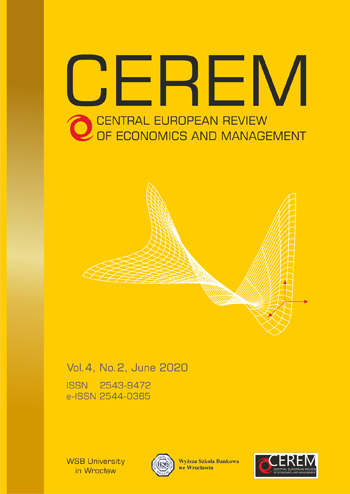Effects of Terrorism and Political Instability on Tourist Behavior: 2016 conflicts in Turkey
DOI:
https://doi.org/10.29015/cerem.866Słowa kluczowe:
Terrorism, Mediterranean tourism, Turkey, Economic impact, Forecast, DemandAbstrakt
Aim: This article investigates the effects of two attacks and a failed coup attempt during 2016 on the tourist behavior. Foreign tourist data for the 2003-2019 period is analyzed to observe irregularities in Turkey’s national tourism income.
Design / Research methods: Linear regression, multivariate regression and regression based static forecasting methods are applied for modeling the relationships. These models are supported with statistical tests.
Conclusions / findings: Results on this study are in accordance with the current literature in the sense that conflicts in 2016 caused a shift in tourist behavior which in turn impaired the tourism industry in Turkey. Repercussions did not endure longer than expected and Turkish tourism recovered rapidly, only facing a serious loss due to the shift in tourism demand trend.
Originality / value of the article: This study makes an addition to the terror and tourism literature, especially for the Mediterranean region and specifically for Turkey both of which are among the most popular tourist destinations worldwide. The aftermath of attacks and the coup attempt in Turkey during 2016 have not been researched before. The data and the outcomes presented sufficient evidence to infer on this issue.
Bibliografia
Afonso-Rodriguez J.A. (2017), Evaluating the dynamics and impact of terrorist attacks on tourism and economic growth for Turkey, “Journal of Policy Research in Tourism, Leisure and Events”, vol. 9 no. 1, pp. 56-81.
Alvarez M. D., Campo S. (2014), The influence of political conflicts on country image and intention to visit. A study of Israel’s image, “Tourism Management”, vol. 40, pp. 70-78.
Basil C., Saleh A.S., Anwar S. (2019), Terrorism and tourism demand. A case study of Lebanon, Turkey and Israel, “Current Issues in Tourism”, vol. 22 no. 1, pp. 50-70.
Brida J.G., Cortez-Jimenez I., Pulina M. (2016), Has the tourism-led growth hypothesis been validated? A literature review, “Current Issues in Tourism”, vol. 19 no. 5, pp. 394-430.
Chow G.C. (1960), Tests of equality between sets of coefficients in two linear regressions, “Econometrica”, vol. 28 no. 3, pp. 591-605.
Drakos K., Kutan A.M. (2003), Regional effects of terrorism on tourism in three Mediterranean countries, “Journal of Conflict Resolution”, vol. 47 no. 5, pp. 621-641.
Enders W., Parise G. F., Sandler T. (1992), A time-series analysis of transnational terrorism. Trends and cycles, “Defense Economics”, vol. 3 no. 4, pp. 305-320.
Ferbar Tratar L., Mojškerc B., Toman A. (2016), Demand forecasting with four-parameter exponential smoothing, “International Journal of Production Economics”, vol. 181 part A, pp. 162-173.
Feridun M. (2011), Impact of terrorism on tourism in Turkey. Empirical evidence from Turkey, “Applied Economics”, vol. 43 no. 24, pp. 3349-3354.
Gupta S., Clements B., Bhattacharya R., Chakravarti S. (2004), Fiscal consequences of armed conflict and terrorism in low- and middle-income countries, “European Journal of Political Economy”, vol. 20, pp. 403-421.
Kleinbaum D.G., Kupper L.L. (1978), Applied regression analysis and other multivariable methods, Duxbury Press, North Scituate, MA.
Liu A., Pratt S. (2017), Tourism’s vulnerability and resilience to terrorism, “Tourism Management”, vol. 60, pp. 404-417.
Llorca-Vivero R. (2008), Terrorism and international tourism. New evidence, “Defence and Peace Economics”, vol. 19 no. 2, pp. 169-188.
Öcal N., Yildirim J. (2010), Regional effects of terrorism on economic growth in Turkey. A geographically weighted regression approach, “Journal of Peace Research”, vol. 47 no. 4, pp. 477-489.
Paternoster R., Brame R., Mazerolle P., Piquero A. (1998), Using the correct statistical test for the equality of regression coefficients, “Criminology”, vol. 36 no. 4, pp. 859-866.
Perles-Ribes J.F., Ramon-Rodriguez A.B., Moreno-Izquedro L., Marti M.T.T. (2018), Winners and losers in Arab uprisings. A Mediterranean tourism perspective, “Current Issues in Tourism”, vol. 21 no. 16, pp. 1810-1829.
Saha S., Yap G. (2014), The moderation effects of political instability and terrorism on tourism development. A cross-country panel analysis, “Journal of Travel Research”, vol. 53 no. 4, pp. 509-521.
Seabra C., Dolnicar S., Abrantes J.L., Kastenholz E. (2013), Heterogeneity in risk and safety perceptions of international tourists, “Tourism Management”, vol. 36, pp. 502-510.
TCMB (2019), International reserves and exchange liquidity report, https://www.tcmb.gov.tr/wps/wcm/connect/264ced94-946c-4bbf-a394-7333fa1ffe16/RT201911T.pdf?MOD=AJPERES&CACHEID=ROOTWORKSPACE-264ced94-946c-4bbf-a394-7333fa1ffe16-mZ69WvU [02.01.2019].
Worldbank (2019), https://data.worldbank.org/country/turkey [02.01.2019].
Yaya M.E. (2009), Terrorism and tourism. The case of Turkey, “Defence and Peace Economics”, vol. 20 no. 6, pp. 477-497.
Pobrania
Opublikowane
Numer
Dział
Licencja
Autor przenosi nieodpłatnie na Wyższą Szkołę Bankową we Wrocławiu , bez ograniczeń terytorialnych, majątkowe prawa autorskie do tego utworu w rozumieniu ustawy z dnia 4 lutego 1994 roku o prawie autorskim i prawach pokrewnych ( Dz.U. 1994, Nr 24, poz. 83 ze zm. )na zasadzie wyłączności, tj. prawo do:
a) wyłącznego używania i wykorzystania utworu w dowolnej działalności przez Wyższą Szkołę Bankową we Wrocławiu, w szczególności w działalność Biblioteki Cyfrowej uruchomionej przez Wyższą Szkołę Bankową we Wrocławiu
b) wytwarzania, utrwalania i zwielokrotniania egzemplarzy utworów wszelkimi technikami, w tym techniką drukarską, reprograficzną, zapisu magnetycznego oraz techniką cyfrową, w szczególności ich zwielokrotniania poprzez dokonywanie zapisów na płytach typu CD,
c) zamieszczenia wybranych fragmentów utworu w celach promocyjnych w publikacjach, materiałach promocyjnych, w sieci Internet oraz sieciach wewnętrznych typu Intranet Wyższej Szkoły Bankowej we Wrocławiu,
d) wprowadzania utworu do pamięci komputera Wyższej Szkoły Bankowej we Wrocławiu,
e) kopiowania i powielania utworu w technologiach fotomechanicznych lub innych znanych w dniu zawarcia umowy (fotokopie, kserokopie itp.),
f) przetworzenia dzieła na formę elektroniczną i nieograniczonego rozpowszechniania w sieci Internet.


